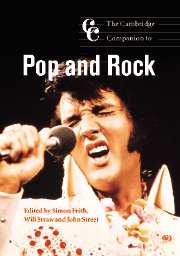2 - The popular music industry
from Part I - Context
Published online by Cambridge University Press: 28 September 2011
Summary
The music industry question is straightforward: how to make money out of music? But the answer is ‘with difficulty’, and pop music as we know it now has been shaped by the problems of making music a commodity and the challenges of adapting money-making practices to changing technologies.
The underlying issue is metaphysical. Music is, by its nature, non-material. It can be heard but not held. It lasts only as long as it plays. It is not something that can, in any direct way, be owned. How to turn this intangible, time-bound aural experience into something that can be bought and sold is thus the question that has driven popular music history since the first wandering performers sang for their supper, and I will examine the changing solutions to this problem shortly. But there's another issue here that needs noting. Music is a universal human practice, like talking or tool making. All of us can do it; all of us do do it: sing to ourselves or our children, hum and chant, dance and tap out a rhythm. To make money out of music, then, means differentiating one set of musical practices (for which we'll pay) from another (for which we don't). The very ubiquity of music in everyday life means that the line between music we make for ourselves and the music for which we go to market is rather more blurred than the music industry would like.
- Type
- Chapter
- Information
- The Cambridge Companion to Pop and Rock , pp. 26 - 52Publisher: Cambridge University PressPrint publication year: 2001
- 28
- Cited by

